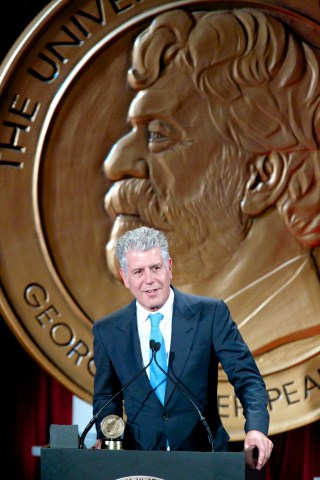Nearly every minute of each day is spent in the presence of others — yet, we are often far removed from each other’s stories and perspectives. What happened to our curiosity and our inquisitiveness toward the nature of ourselves and others?
On an evening in early June, Anthony Bourdain — chef, television host, author and essayist — decided it was time to close the door, flip up the chairs and turn out the light. A man who spent the last several years of his life alone in the harsh lamplight of unfamiliar hotel rooms seemed to have decided it was best to end the journey on his own terms.
Bourdain’s death reverberated within the restaurant and journalism communities alike. Once a struggling chef with a ravaging heroin addiction, Bourdain broke from obscurity to celebrity after an op-ed he wrote appeared in The New Yorker in 1999. From there, he eventually left the kitchen behind for the road — making his mark as a writer and documentarian.

Anthony Bourdain, pictured during the 2013, during his Peabody Award acceptance speech.
While food may have been a love for Bourdain, it was writing and storytelling that were his true passions, kept alight by his insatiable curiosity. Storytelling moulded his career and kept him on the road 250 days a year. It was what gave his life meaning, and yet, perhaps, it also contributed to its end.
Bourdain was a food-and-travel writer, but if anyone were to sit down and watch a handful of episodes from his CNN series Parts Unknown, they would quickly realize that it wasn’t all about the food. Food was merely a vehicle for storytelling — it was what propelled the narrative forward and allowed him insight into the individuals he encountered.
Bourdain used food as a conversation starter — often sharing meals with strangers in their houses and restaurants all over the world. It was his way of introducing the stories of the people on the other side of the plate. The familiar stories of love, loss, hardship and happiness were revealed over a bowl of noodles or in the flow of alcohol from a glass.
Bourdain’s relationship with people and the places and spaces they inhabit is an example of the value to be found in taking a minute to engage with the world through the eyes of another. The danger of our affinity for confirmation bias leads us to a shallow, inverted world. When we become insulated inside our own beliefs and thoughts, we set ourselves up for disaster.
Bourdain showed us that, in spite of differences of opinion, we can all sit down and learn from one another. We can experience the world of another, and perhaps, come back with a greater understanding of ourselves.
Bourdain said that you can learn a lot about a person when you share a meal with them. We should test his theory and make time to sit down with the people we know well or those we wish to know better.
Rather than continue on, ignorant to outside perspectives and stagnant in our own narratives, Bourdain taught us that there is so much to learn from one another. Let’s all take a closer look at our friends, old and new, through the quiet comfort of eating and drinking. We may discover things we would have had a hard time finding out otherwise.
—
Erin Matthews / Opinions Editor
Photo: Wikimedia Commons / Supplied
Leave a Reply